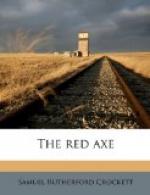It was a summer midnight—not like the one I told of when the story began, white with snow and glittering with the keen polish of frost. But a soft, still night, drowsy yet sleepless, with an itch of thunder tingling in the air—and, indeed, already the pulsing, uncertain glow of sheet-lightning coming and going at long intervals along the south.
I crouched and nestled in the hole in the wall where I had long ago hidden the hated red cloak, pulling my knees up uncomfortably to my chin. And great lumps of bone they were, knotted as if a smith had made them in the rough with a welding hammer and had forgotten to reduce them with the file afterwards. At that time I was thoroughly ashamed of my knees.
But no matter for them now. Duke Casimir passed in and shut the door.
“Gottfried,” I heard him say, “I am a dead man!”
These words from the great Duke Casimir startled me, and though I knew well enough that Michael Texel, the Burgomeister’s son, was waiting for me by the corner of the Jew’s Port, I decided that, as I might never hear Duke Casimir declare his secretest soul again, I should even bide where I was; and that was in the crevice of the wall among the old clothes, which gave off such a faint, musty, sleepy smell I could scarcely keep awake.
But the Duke’s next words effectually roused me.
“A dead man!” repeated Casimir. “I have not a friend in all the realm of the Mark besides yourself. And there is none of all that take my bounty or eat my bread that is sorry for me. See here,” he said, querulously, “twice have I been stricken at to-day—once a tile fell from a roof and dinted the crown of my helmet, and the second time a young man struck at my breast with a dagger.”
“Did he wound you, Duke Casimir?” asked my father, speaking for the first time, but in a strangely easy and equal voice, not with the distance and deference which he showed to his lord in public.
“Nay, Gottfried,” replied Duke Casimir; “but he bruised my shirt of mail into my breast.”
And I heard plainly enough the clinking of the rings of chain-armor as the Duke showed his hurt to my father. Presently I heard his voice again.
“And the Bishop has touched me in a new place,” he said. “He declares that he will lay his interdict upon me and my people—ill enough to hold in hand as they are even now. When that is done they will rise in rebellion. My very men-at-arms and knights I cannot depend upon—only upon you and the Black Riders.”
“In the matter of the Bishop’s interdict, or in other matters, do you mean that you can trust my counsel, Duke Casimir?” asked my father.
“’Tis in the burial of the dead that the shoe will pinch first with these burghers of Thorn and among our soldiers at the Wolfsberg. For mass, indeed, they care not a dove’s dropping—but that the corpse should be carried to a dog’s grave, that they cannot away with. Red Axe, I tell you we shall have the State of the Mark about our ears in the slipping of a hound’s leash—and as for me, I know not what I shall do.”




